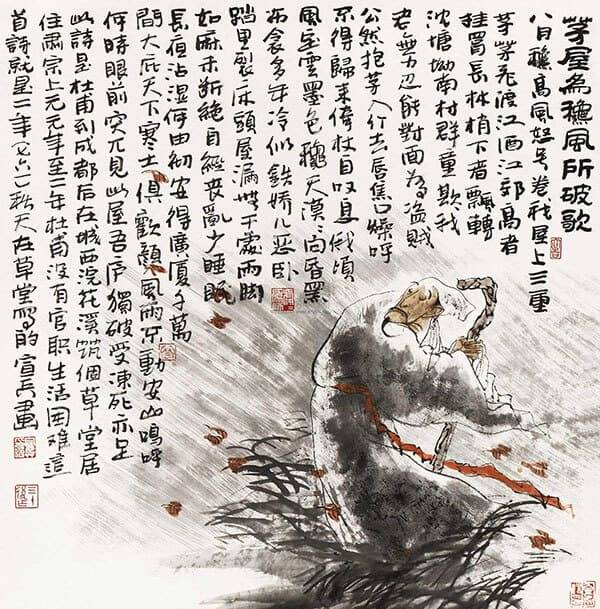
· Song of My Cottage Unroofed By Autumn Gales
In the eighth month autumn's high winds angrily howl,
And sweep three layers of thatch from off my house.
The straw flies over the river, where it scatters,
Some is caught and hangs high up in the treetops,
Some floats down and sinks into the ditch.
The urchins from the southern village bully me, weak as I am;
They're cruel enough to rob me to my face,
Openly, they carry the straw into the bamboo.
My mouth and lips are dry from pointless calling,
I lean again on my cane and heave a sigh.
The wind soon calms, and the clouds turn the colour of ink;
The autumn sky has turned completely black.
My ancient cotton quilt is cold as iron,
My darling children sleep badly, and kick it apart.
The roof leaks over the bed- there's nowhere dry,
The rain falls thick as hemp, and without end.
Lost amid disorder, I hardly sleep,
Wet through, how can I last the long nights!
If I could get a mansion with a thousand, ten thousand rooms,
A great shelter for all the world's scholars, together in joy,
Solid as a mountain, the elements could not move it.
Oh! If I could see this house before me,
I'd happily freeze to death in my broken hut!
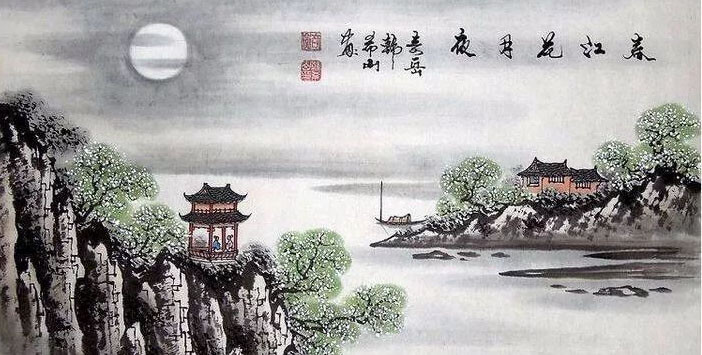
· Spring Blossoms On The Moonlit River
Tides of the spring river washes into the levelled ocean,
And with the tide, a luminous moon is born above sea surface.
Shimmering with the waves for thousands of li,
Where is there no moonlight gracing this spring river!?
–
The river snakes around the lush green fields,
Moon shining upon the flower filled forest, making all appear like sleet.
Flowing frost from the sky appears not to be drifting,
The white sand of river banks cannot be seen.
–
River and sky becomes one, with not the finest of dust,
Shining brightly in the sky is that lone wheel of a moon.
By this riverside, what person was first to see the moon?
This river’s moon, what year did it first shine upon the people?
–
Generations after generations of human life, not at all does it depletes,
The river’s moon is still the same year after year.
It is unknown for who this river’s moon awaits for,
Only seeing this long river sending off its flowing water.
–
A spread of white clouds vaguely fades far into the distance,
Such unbearable sorrows of parting by Qing Feng Riverside.
Which family’s little boat is drifting along the rivers tonight? (Referring to a man out journeying)
Where is the yearning love in the moonlit tower? (Referring to his wife’s longing for him at home)
–
Pitiful it is, the lingering moonlight illuminating the tower,
It should be reflecting the one who left in the dresser table mirror.
Unable to roll it away from the jade-like chamber with the closing of blinds,
Brushed away on the clothes pounding stone it is, but still comes back.
(The moon shines in as though it understands the pain of longing, but should the moon really understand her sorrows then it should let the lady see her lover in the mirror to ease her longing, instead its lingering presence only adds to her yearnings)
–
In this moment, both gazes at the moon, but unable they are to hear each other,
Only wishing the brilliance of the moon is shining upon the dear husband.
Swans and geese flies long distances but cannot fly beyond the light,
Fishes and [marine] reptiles dives and jumps but only forms ripples in the water.
(Swans and geese and fly far but cannot fly to him, fishes and marine reptiles can swim deep into the water but cannot swim to him)
–
Dreaming of flowers descending upon the tranquil pool last night,
Pitiful it is, half of spring has past yet there is still no return.
The running river water flowing by, along with spring,
Into the river pool, the descending moon goes, tilting west again.
–
The setting moon hiding deeply into the ocean mist,
Jie Shi and Xiao Xiang, the distance between is infinite. (One place south, one place north, rendering a reunion hopeless)
It is unknown how many people managed to return home riding the moonlight,
Only knowing the descending moon stirs immense emotions amongst the trees by the riverbank.
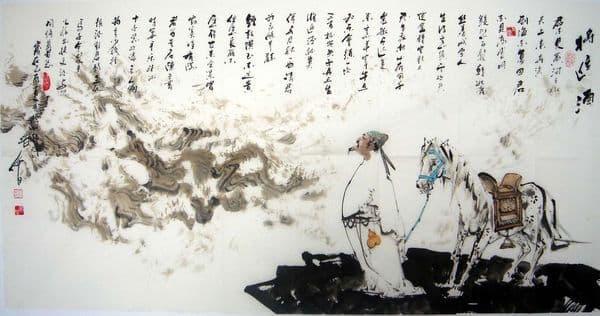
· Invitation to Wine
Do you not see the Yellow River come from the sky,
Rushing into the sea and ne'er come back?
Do you not see the mirrors bright in chambers high
Grieve o'er your snow-white hair though once it was silk-black?
When hopes are won, oh! drink your fill in high delight,
And never leave your wine-cup empty in moonlight!
Heaven has made us talents, we're not made in vain.
A thousand gold coins spent, more will turn up again.
Kill a cow, cook a sheep and let us merry be,
And drink three hundred cupfuls of wine in high glee!
Dear friends of mine,
Cheer up,cheer up!
I invite you to wine.
Do not put down your cup!
I will sing you a song, please hear,
O hear! lend me a willing ear!
What difference will rare and costly dishes make?
I only want to get drunk and never to wake.
How many great men were forgotten through the ages?
But great drinkers are more famous than sober sages.
The Prince of Poets feast'd in his palace at will,
Drank wine at ten thousand a cask and laughed his fill
A host should not complain of money he is short,
To drink with you I will sell things of any sort.
My fur coat worth a thousand coins of gold
And my flower-dAppled horse may be sold
To buy good wine that we may drown the woe age-old.
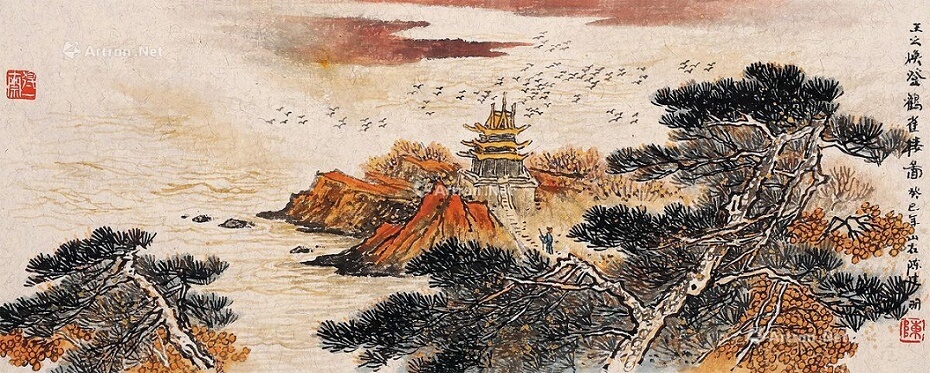
· At Heron Lodge ( Climbing Stork Tower )
Mountains cover the white sun,
And oceans drain the golden river;
But you widen your view three hundred miles
By going up one flight of stairs.
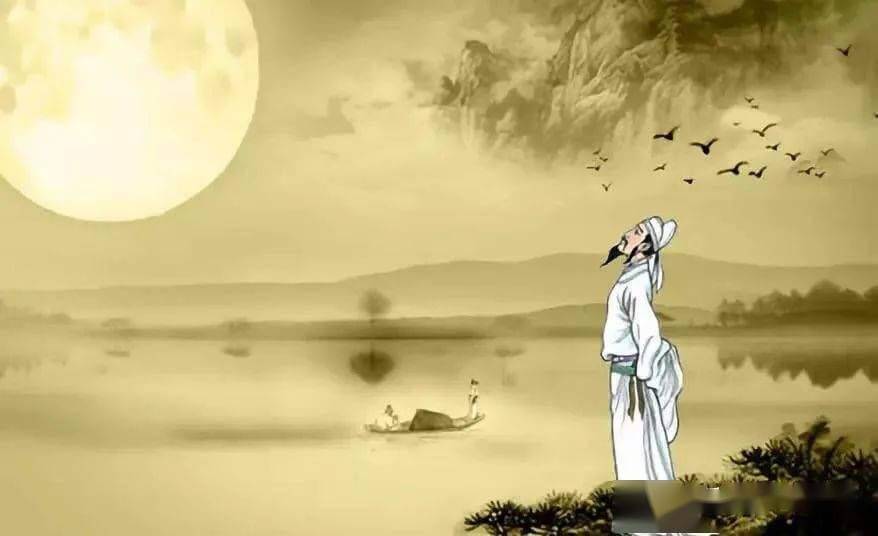
· Thoughts in the Silent Night
So bright a gleam on the foot of my bed --
Could there have been a frost already?
Lifting myself to look, I found that it was moonlight.
Sinking back again, I thought suddenly of home.
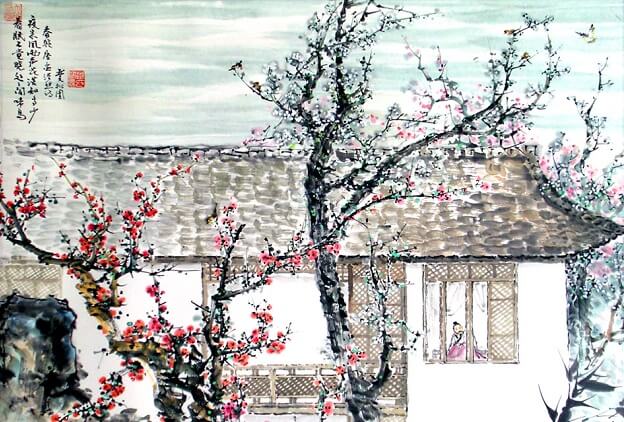
· A Spring Morning
I awake light-hearted this morning of spring,
Everywhere round me the singing of birds --
But now I remember the night, the storm,
And I wonder how many blossoms were broken.
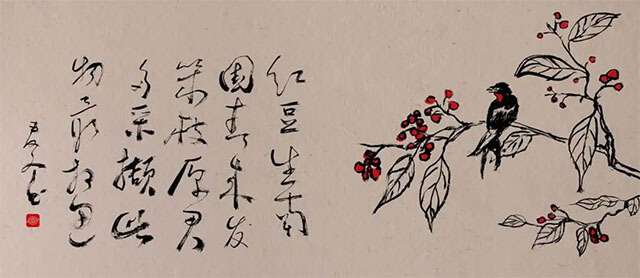
· Lovesickness
When those red berries come in springtime,
Flushing on your southland branches,
Take home an armful, for my sake,
As a symbol of our love.
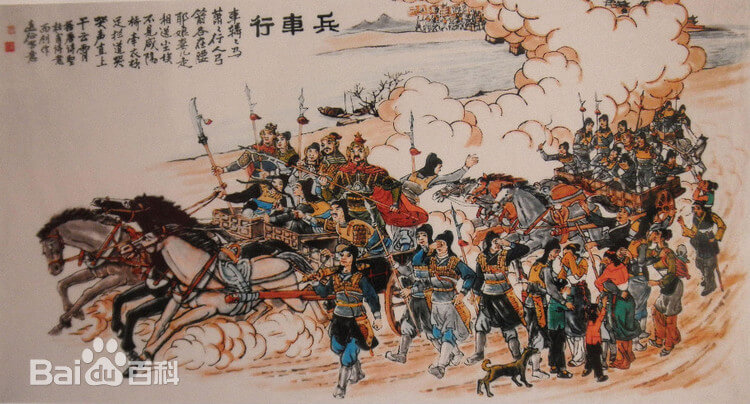
· A Song of War-Chariots
The war-chariots rattle,
The war-horses whinny.
Each man of you has a bow and a quiver at his belt.
Father, mother, son, wife, stare at you going,
Till dust shall have buried the bridge beyond Changan.
They run with you, crying, they tug at your sleeves,
And the sound of their sorrow goes up to the clouds;
And every time a bystander asks you a question,
You can only say to him that you have to go.
...We remember others at fifteen sent north to guard the river
And at forty sent west to cultivate the campfarms.
The mayor wound their turbans for them when they started out.
With their turbaned hair white now, they are still at the border,
At the border where the blood of men spills like the sea --
And still the heart of Emperor Wu is beating for war.
...Do you know that, east of China's mountains, in two hundred districts
And in thousands of villages, nothing grows but weeds,
And though strong women have bent to the ploughing,
East and west the furrows all are broken down?
...Men of China are able to face the stiffest battle,
But their officers drive them like chickens and dogs.
Whatever is asked of them,
Dare they complain?
For example, this winter
Held west of the gate,
Challenged for taxes,
How could they pay?
...We have learned that to have a son is bad luck-
It is very much better to have a daughter
Who can marry and live in the house of a neighbour,
While under the sod we bury our boys.
...Go to the Blue Sea, look along the shore
At all the old white bones forsaken --
New ghosts are wailing there now with the old,
Loudest in the dark sky of a stormy day.
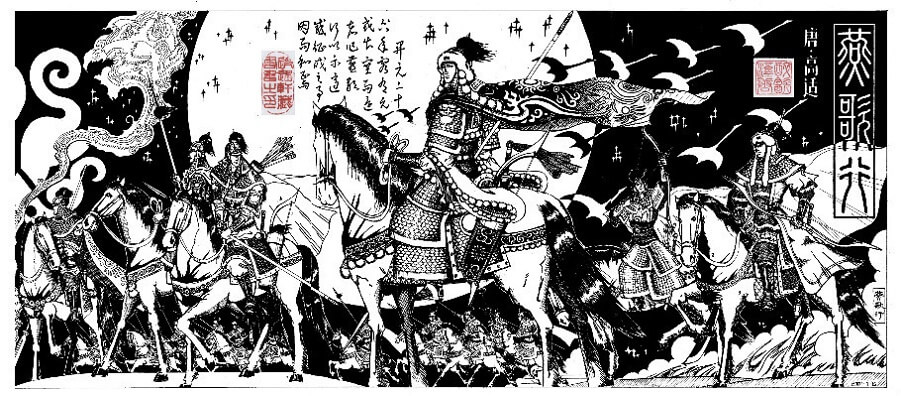
· A Song of the Yan Country
In the sixth year of Kaiyuan, a friend returned from the border and showed me the Yan Song. Moved by what he told me of the expedition, I have written this poem to the same rhymes.
The northeastern border of China was dark with smoke and dust.
To repel the savage invaders, our generals, leaving their families,
Strode forth together, looking as heroes should look;
And having received from the Emperor his most gracious favour,
They marched to the beat of gong and drum through the Elm Pass.
They circled the Stone Tablet with a line of waving flags,
Till their captains over the Sea of Sand were twanging feathered orders.
The Tartar chieftain's hunting-fires glimmered along Wolf Mountain,
And heights and rivers were cold and bleak there at the outer border;
But soon the barbarians' horses were plunging through wind and rain.
Half of our men at the front were killed, but the other half are living,
And still at the camp beautiful girls dance for them and sing.
...As autumn ends in the grey sand, with the grasses all withered,
The few surviving watchers by the lonely wall at sunset,
Serving in a good cause, hold life and the foeman lightly.
And yet, for all that they have done, Elm Pass is still unsafe.
Still at the front, iron armour is worn and battered thin,
And here at home food-sticks are made of jade tears.
Still in this southern city young wives' hearts are breaking,
While soldiers at the northern border vainly look toward home.
The fury of the wind cuts our men's advance
In a place of death and blue void, with nothingness ahead.
Three times a day a cloud of slaughter rises over the camp;
And all night long the hour-drums shake their chilly booming,
Until white swords can be seen again, spattered with red blood.
...When death becomes a duty, who stops to think of fame?
Yet in speaking of the rigours of warfare on the desert
We name to this day Li, the great General, who lived long ago.
List of Chinese poets
- Ban Gu Cao Cao Cao Zhi Cao Pi Cai Wenji Kong Rong Liu Bang Liu Che Qin Jia Ruan Ji Su Wu Wang Can Xiang Yu Xu Gan Zhang Heng Anonymous
- Tao Yuanming Zhang Hua
- Bai Juyi Bao Junhui Cen Shen Chen Zi'ang Du Fu Du Mu Gao Shi Han Yu He Zhizhang Jia Dao Li Bai (Li Po) Li Shangyin Liu Yuxi Liu Zongyuan Luo Binwang Li Qi Liu Changqing Lu Lun Li Yu Meng Haoran Meng Jiao Qian Qi Wang Bo Wang Changling Wang Wei Wang Zhihuan Wei Yingwu Wen Tingyun Xu Hui Yuan Zhen Yu Xuanji Yu Shinan Yuan Jie Zhang Jiuling Zhang Ji Zhang Zhihe Zhang Xu
- Fan Zhongyan Huang Tingjian Jiang Kui Lu You Li Qingzhao Liu Yong Mei Yaochen Ouyang Xiu Qin Guan Su Shi Song Qi Wang Anshi Xin Qiji Yang Wanli Yue Fei Yan Jidao Yan Shu Zhang Xian Zhou Bangyan Zhu Shuzhen Zhu Xi
- Bai Pu Guan Hanqing Ma Zhiyuan Xu Zaisi
- Tang Yin Tang Xianzu Xu Wei Yu Qian Yang Shen
- Cao Xueqin Nalan Xingde Pu Songling Tsangyang Gyatso Wang Guowei Zheng Xie Zhao Yi